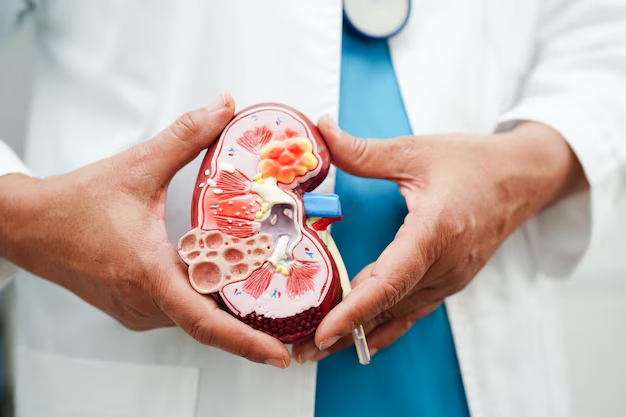Your Guide to How Does Kidney Disease Cause Hypertension
What You Get:
Free Guide
Free, helpful information about HyperTension FAQ and related How Does Kidney Disease Cause Hypertension topics.
Helpful Information
Get clear and easy-to-understand details about How Does Kidney Disease Cause Hypertension topics and resources.
Personalized Offers
Answer a few optional questions to receive offers or information related to HyperTension FAQ. The survey is optional and not required to access your free guide.
Understanding the Connection: How Kidney Disease Leads to Hypertension
When we think of our body's complex machinery, the kidneys often don’t come to mind as pivotal players in maintaining overall health. However, these bean-shaped organs are crucial for more than just filtering waste. They also play an essential role in regulating blood pressure. When kidney function deteriorates, the balance they maintain can be disrupted, leading to hypertension, or high blood pressure.
The Kidney-Blood Pressure Link
How do kidneys control blood pressure? Normally, kidneys manage blood pressure by regulating the amount of fluid and sodium in the body and releasing hormones that influence blood vessel constriction. When kidneys are healthy, they help maintain a balance that ensures blood flows smoothly. However, when kidney disease sets in, this balance is altered.
Mechanisms at Play
Fluid and Sodium Retention: Damaged kidneys struggle to filter out excess sodium and fluid from the bloodstream. This accumulation of fluid increases the volume of blood, leading to higher blood pressure.
Hormonal Influence: The kidneys produce hormones like renin, which affect blood vessel tightness and blood volume. In the context of kidney disease, the regulation of these hormones can become impaired, often resulting in increased blood pressure.
Damage to Blood Vessels: Chronic kidney disease can also directly damage the blood vessels, both within the kidneys and throughout the body, contributing further to hypertension.
The Reciprocal Relationship
It's important to note that hypertension doesn't just result from kidney disease—it can also be a contributing factor. High blood pressure can lead to further kidney damage, creating a vicious cycle that accelerates health decline.
Navigating Life with Kidney Disease and Hypertension
Living with both kidney disease and hypertension requires diligent management. Fortunately, various resources and assistance programs can support individuals in managing their condition and the associated financial strain.
- Government Aid Programs: Programs like Medicaid and Medicare often offer coverage options for those with chronic conditions, providing access to treatments and medications at reduced costs.
- Financial Assistance: Many non-profits and kidney disease foundations offer financial support for treatments, medications, and transportation needs.
- Debt Relief Options: If medical bills have accumulated, talking to a financial advisor about consolidating or negotiating debts can offer relief.
- Educational Grants: For families affected, educational grants can support learning opportunities and career development.
- Credit Card Solutions: Low-interest or medical-specific credit cards can be an option for managing healthcare costs, ensuring that essential treatments are prioritized.
Resources through a Kidney Disease Lens
Here's a quick list of useful resources:
- 💸 Medicaid & Medicare: Federal programs that can help cover costs for those who qualify.
- 🏥 Kidney Disease Foundations: Often provide direct financial assistance or resources for discounts.
- 📅 Patient Assistance Programs: Offered by pharmaceutical companies to reduce medication expenses.
- 💳 Medical Credit Cards: Designed for managing healthcare costs with deferred interest plans.
- 🎓 Educational Grants: Support for those whose educational paths are impacted by family medical needs.
Understanding how kidney disease can lead to hypertension is the first step in managing the condition effectively. Equipped with this knowledge and supported by available resources, individuals can better navigate the intertwined challenges of kidney health and blood pressure control.
What You Get:
Free HyperTension FAQ Guide
Free, helpful information about How Does Kidney Disease Cause Hypertension and related resources.

Helpful Information
Get clear, easy-to-understand details about How Does Kidney Disease Cause Hypertension topics.

Optional Personalized Offers
Answer a few optional questions to see offers or information related to HyperTension FAQ. Participation is not required to get your free guide.


Discover More
- a 66 Year Old Female With a History Of Hypertension
- Are Eggs Bad For Hypertension
- Are Eggs Good For Hypertension
- Are Endocrine Disorders Causing Hypertension Rare
- Can Adderall Cause Hypertension
- Can Alcohol Cause Hypertension
- Can Allergies Cause Hypertension
- Can Anemci People Get Hypertension
- Can Anemia Cause Hypertension
- Can Antibiotics Cause Hypertension
